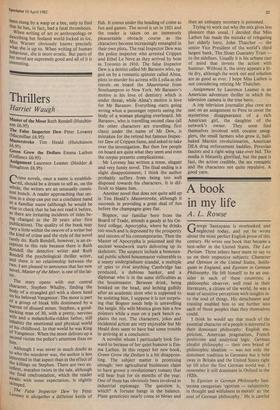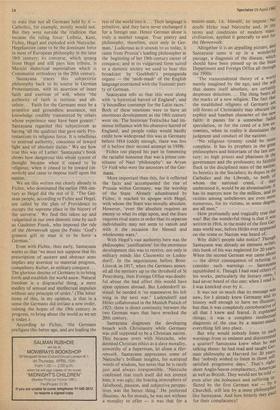A book in my life
A. L. Rowse
George Santayana is overlooked and neglected today, and yet he wrote about the most perfect English prose of this century. He wrote one book that became a best-seller in the United States, The Last Puritan. Three others have more to say to us on their respective subjects: Character and Opinion in the United States, Solilo- quies in England, and Egotism in German Philosophy. He felt himself to be an out- sider in each of these countries; a philosophic observer, well read in their literatures, a citizen of the world, he was a man of sensitive perception with insights in- to the soul of things. His detachment and training enabled him to see further into each of those peoples than they themselves could.
I think he would say that much of the essential character of a people is mirrored in their dominant philosophy: English em- piricism, American pragmatism, French positivism and analytical logic. German idealist philosophy — their own brand of philosophic idealism — was not only the dominant tradition in Germany but it held sway in Britain and the United States right up till after the first German world war. I remember it still dominant in Oxford in the 1920s.
In Egotism in German Philosophy San- tayana categorises 'egotism — subjectivity in thought and wilfulness in morals' as 'the soul of German philosophy.' He is careful
to state that not all Germans held by it Catholics, for example, mostly would not. But they were outside the tradition that became the ruling force: Leibniz, Kant, Fichte, Hegel and exploded with Nietzsche. Hegelianism came to be the dominant force in most of European philosophy in the later 19th century; its converse, which sprang from Hegel and still pays him tribute, is Marxist dialectical materialism which is Communist orthodoxy in the 20th century.
Santayana traces this subjectivist philosophy back to its source in German Protestantism, with its assertion of inner faith and exertion of will, where 'the authority of faith is intrinsic and ab- solute... Faith for the Germans must be a primitive and groundless assurance, not knowledge credibly transmitted by others whose experience may have been greater.' Santayana regarded this subjectivism as having 'all the qualities that gave early Pro- testantism its religious force. It is rebellious to external authority, conscious of inward light and of absolute duties.' We see how true this was of Luther. Santayana's book shows how dangerous this whole system of thought became when it ceased to be religious; when it ceased to be inward (in- nerlich) and came to impose itself upon the nation.
We see this written out clearly already in Fichte, who dominated the earlier 19th cen- tury as Hegel did the rest of it. 'The Ger- man people, according to Fichte and Hegel, are called by the plan of Providence to occupy the supreme place in the history of the universe.' We find this taken up and vulgarised in our own demotic time by such as Gauleiter Frank, who imposed the rule of the Herrenvolk upon the Poles: 'God's greatest gift to man is to be born a German.'
Even with Fichte, thus early, Santayana warns us that 'we must not suppose that his prescription of austere and abstract aims implies any aversion to material progress, compulsory Kultur, or military conquest ... The glorious destiny of Germany is to bring forth and establish the world anew. Natural freedom is a disgraceful thing, a mere medley of sensual and intellectual impulses without any principle of order.' (The bitter irony of this, in my opinion, is that in a sense the Germans did initiate a new order, ruining the hopes of the 19th century in progress, to bring about the world as we see it today.) According to Fichte, 'the Germans prefigure this better age, and are leading the rest of the world into it ... Their language is primitive, and they have never exchanged it for a foreign one. Hence German alone is truly a mother tongue. True poetry and philosophy, therefore, exist only in Ger- man.' Ludicrous as it sounds to us today, it came from Prussia's leading philosopher at the beginning of her 19th-century career of conquest; and in its vulgarised form suited to a demotic society we used to hear this broadcast by Goebbels's propaganda organs — the `mish-mash' of the English language contrasted with the Teutonic puri- ty of German.
Saatayana tells us that this went along with 'a hysterical hatred of England', and 'a boundless contempt for the Latin races.' Both of these emotions were to have an enormous development as the 19th century went on. The historian Treitschke had im- mense influence with his obsessive hatred of England, and people today would hardly credit how widespread this was in Germany before 1914 (oddly enough, there was less of it before their second attempt in 1939).
Fichte too played his part in fomenting the racialist nonsense that was a prime con- stituent of Nazi 'philosophy': an Aryan Ur Volk who were the ancestors of the Ger- mans.
More important than this, for it reflected the facts and accompanied the rise of Prussia within Germany, was the worship of the State. Already adumbrated by Fichte, it reached its apogee with Hegel, with whom the State was morally absolute. However, 'even the absolute requires an enemy to whet its edge upon, and the State requires rival states in order that its separate individuality may not seem to vanish and with it the occasion for blessed and wholesome wars.'
With Hegel's vast authority here was the philosophic 'justification' for the enormous development this was to receive, not only in military minds like Clausewitz or Luden- dorff. In the negotiations before Brest- Litovsk in 1917, when the Germans annex- ed all the territory up to the threshold of St Petersburg, their Foreign Office was doubt- ful about the bad effect this would have upon opinion abroad. But Ludendorff in- sisted: he needed it 'to manoeuvre his left wing in the next war.' Ludendorff and Hitler collaborated in the Munich Putsch of 1923; there is direct continuity between the two German wars that have wrecked the 20th century.
Santayana diagnoses the developing breach with Christianity while Germany was still supposed to be a Christian nation. This became overt with Nietzsche, who detested Christian ethics as a slave morality, unworthy of a Superman, let alone a. Her- renvolk. Santayana appreciates some of Nietzsche's brilliant insights, his scattered words of wisdom, but notes that he is rarely just and always irresponsible. 'Nietzsche confessed that truth itself did not interest him; it was ugly; the bracing atmosphere of falsehood, passion, and subjective perspec- tives was the better thing.' He preferred illusions. As for morals, he was not without a morality to offer — it was that for a master-man, i.e. himself, to impose. NO doubt Hitler read Nietzsche and, in the terms and conditions of modern mass" civilisation, applied it generally to and for the Herrenvolk. Altogether it is an appalling picture, and Santayana sums it up in a wonderful passage, a diagnosis of the disease, which should have been pinned up in the State Department and Foreign Office all through the 1930s: `The transcendental theory of a worl,c1, merely imagined by the ego, and the win that deems itself absolute, are certainly desperate delusions. , . The thing bears all the marks of a new religion. The fact that the established religions of Germany are still forms of Christianity may obscure the explicit and heathen character of the nevi faith: it passes for a somewhat faded speculation, or for the creed of a few ex- tremists, when in reality it dominates the judgment and conduct of the nations. `No religious tyranny could be more complete. It has its prophets in the great philosophers and historians of the last cen- tury; its high priests and pharisees in the, government and the professors; its faithful' flock in the disciplined mass of the nation; its heretics in the Socialists; its dupes in the Catholics and the Liberals, to both of whom the national creed, if they understood it, would be an abomination. It has its martyrs now by the million, and its victims among unbelievers are even more numerous, for its victims, in some degree, are all men:' How profoundly and tragically true that was! But the wonderful thing is that it was written in 1916, in the midst of the first Ger- man world war, before Hitler ever appeared on the scene or Nazism was heard of.
Why didn't people take notice? Though Santayana was already an eminent writer, this book of his was neglected for 20 Years' When the second German war came about — the direct consequence of refusing to consider such warnings — SantaYana, republished it. Though I had read others ti his works, particularly the literary ones, ,` had never heard of this one; when I read it, I was knocked over by it. It was not so much that its message ‘413S new, for I already knew Germany and its history well enough to have no illusions:, but that it was completely corroborative of all that I knew and feared. It explained things; it was a complete intellectual diagnosis of the case by a master-Mind' everything fell into place. But why would nobody listen to such. warnings from so eminent and disinterested a quarter? Santayana knew what he was talking about: he had read and taught Ger" man philosophy at Harvard for 20 years. But 'nobody .wished to listen in those self- satisfied progressive days.' That's right: sheer Anglo-Saxon complacency, American as well as British. They would not be told -- even after the holocaust and suffering in- flicted by the first German war — by 3 Churchill, still less by a mere philosopher like Santayana. And how bitterly they Paw for their complacency!



































 Previous page
Previous page